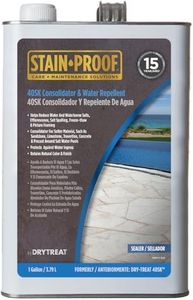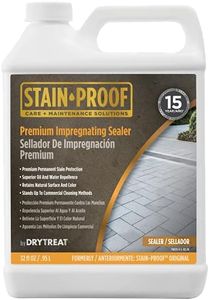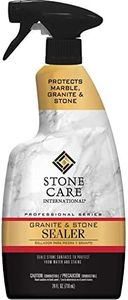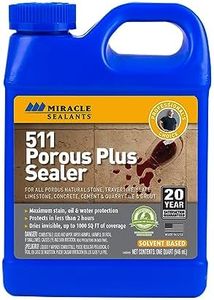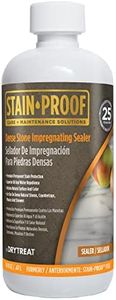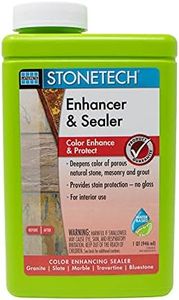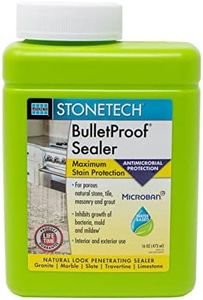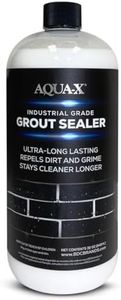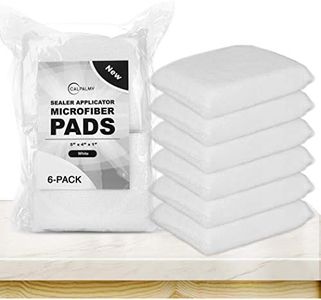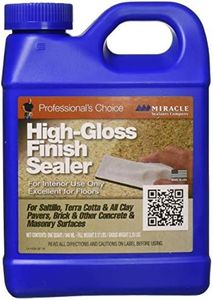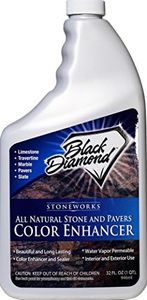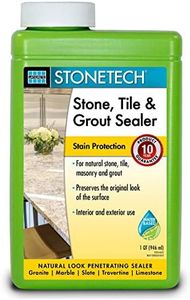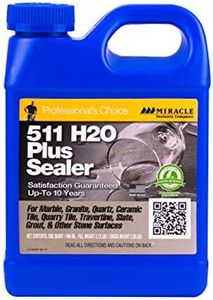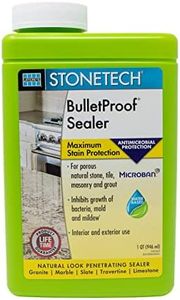We Use CookiesWe use cookies to enhance the security, performance,
functionality and for analytical and promotional activities. By continuing to browse this site you
are agreeing to our privacy policy
10 Best Stone Sealers
From leading brands and best sellers available on the web.By clicking on a link to a third party's website, log data is shared with that third party.
Buying Guide for the Best Stone Sealers
Choosing the right stone sealer is essential for protecting your stone surfaces from stains, moisture, and daily wear. The perfect sealer not only helps maintain the natural beauty of your stone but also makes cleaning and maintenance much easier. When picking a stone sealer, it's helpful to understand your stone type, the environment it’s in (like kitchen, bathroom, or outdoors), and how much use or exposure the surface will get. With this in mind, we'll look at the most important features to help you find the perfect match for your needs.Type of SealerThis refers to the way the sealer protects the stone and how it interacts with the surface. There are two main types: penetrating (impregnating) sealers, which soak into the stone and protect against stains from within, and topical sealers, which create a surface coating for more visible protection and shine. Penetrating sealers are especially good for natural stone like granite or marble, where you want the original look to shine through, while topical sealers work well on surfaces needing extra resistance or a specific finish. Your choice depends on whether you want a natural appearance or extra surface toughness, so consider what matters most for your usage.
Finish (Gloss vs. Matte)The finish determines how your stone will look after sealing—some sealers leave a glossy, shiny finish while others keep the stone's natural matte appearance. Gloss finishes are usually achieved with topical sealers and are popular if you like a polished, eye-catching surface. Matte finishes keep the natural look and are common with penetrating sealers. Choose a finish based on your style preference or the location—high-shine may show scratches more easily in busy areas, for instance.
Water & Stain ResistanceStone sealers vary in how well they protect against water and different types of stains, such as oil, wine, or food. Higher-rated sealers resist both water (hydrophobic) and oil-based stains (oleophobic), which is important in kitchens or outdoor spaces. If you’re sealing stone in a bathroom, focus on water resistance; for counters or dining areas, prioritize oil and food stain protection. Consider where spills are most likely in your home when picking a sealer.
BreathabilityBreathability means how well the sealer allows moisture vapor to pass through the stone without trapping it underneath, which is important to prevent damage like spalling or mildew, especially for outdoor or damp environments. Penetrating sealers tend to be more breathable, making them ideal for natural stone patios or showers. If airflow is a concern, or if your stone is outside where rain and dew are issues, seek a breathable sealer.
Lifespan and MaintenanceNot all sealers last the same amount of time—some need reapplying every year, while others can protect for several years. Lifespan depends on usage, cleaning routines, and traffic. Longer-lasting sealers reduce the frequency and effort of maintenance, which is helpful for busy or less-accessible areas. Think about how often you want to reseal and how much maintenance you’re willing to manage, relying on the expected durability for your environment.
Drying and Cure TimeThis tells you how long the sealer takes to dry and reach full strength. Some sealers dry in an hour or two, while others need several days to fully 'cure' and provide maximum protection. Fast-drying sealers are convenient for surfaces that need quick turnaround, but longer cure times often mean deeper, longer-lasting protection. Match cure time with your schedule and patience—if you can let an area sit unused, a slower-curing product may provide better results.
Compatibility with Stone TypeNot all sealers work on every kind of stone. Softer, more porous stones (like limestone, sandstone, or marble) need deeper penetrating protection, while harder, less porous stones (like granite) may only need a lighter sealer. Always check that a sealer is safe for your exact stone type to avoid discoloration or poor performance. If you’re unsure about your stone, consult with a professional or test a small, hidden spot before applying broadly.
